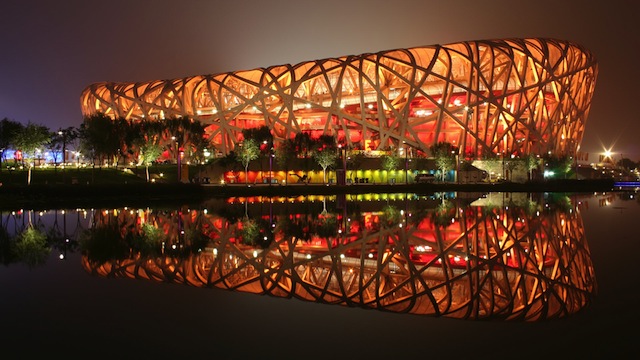Anyone who doubts that China will one day win the World Cup – does not understand that magnificent country or the character of its remarkable people.
Of course this event is not going to happen next year in Brazil. China failed to even qualify for next year’s World Cup. And, after the recent humiliating defeat by a second-string Thailand side last month on 15 June whereby the national side lost at home 5-1, then the current Chinese football scene is looking pretty grim to say the least. It is a situation that, after years of neglect and bizarre levels of corruption, the game has sunk to its lowest point. The whole system now finally needs completely dismantling from top to bottom and starting afresh.
China will not win the World Cup after Brazil when the competition moves to Russia in 2018. Nor even in 2022 in the searing heat of Qatar. But China could well triumph in 2026, and, for certain, this great nation will be there or thereabouts by 2030. That I can absolutely guarantee. And, who knows, by this date the competition might even once again be hosted in England. It will have been 64 years on from the date of our nation’s triumph in 1966 – so such an event would be a double whammy for me if both predictions should turn out to be true.
Now, for someone who is supposed to be a “ football visionary ” (note I do not make that claim for myself) then I reckon that a prediction of seventeen to twenty years hence is about right for China winning the World Cup. Twenty-five years ago I told the English football world what would happen to Manchester United from 1989 onwards when I became a director of that club. I predicted that the club would become the greatest sporting brand the football world had ever seen. And, that Manchester United would go on to dominate the English domestic football scene. Even my fiercest critics would reluctantly now admit that I got that bang on right. But back in 1989 no one believed me, save for Sir Alex Ferguson of course. In fact they all thought I was a sheer fruitcake (some still do). So, I doubt that any one will believe my predictions for China either. However, I am just as certain of my predictions here for China’s future footballing success as I was for Manchester United’s future success back in 1989. China one day will be the Kings of football, and, I predict this day will come in or around the year 2030.
You see this fact all turns on the axis that drives the intrinsic disciplined character of the Chinese race together with the notion that China, for all its outside critics on its government’s tight control over every facet of Chinese life – is a nation that cares deeply about how the rest of the world views its prowess in all things. And football is a game and a sport whereby the country is exposed as a massive underachiever. The rulers of that great nation are only too aware of this fact and they know that such a state of affairs is no longer acceptable to themselves as the rulers or the millions of Chinese football fans.
It is true, that for the most part, the people would like to feel that they essentially hold true to the wisdom and patience of their great philosophical mentor, “the Master”, Confucius. The great man said pursue knowledge, foster learning in all its forms with the acquired skill of patience and wisdom is sure to arrive eventually. But, above all, the notion of collectivism and people working together for the common good was the key Confucian message. A return to a touch of Confucian ideals in this respect – as opposed to fervent individualism of later years – is certainly required if the team sport of football is to be progressed.
I’m confident that the Chinese spirit and desire to improve together with their innate will to win – is sure to ultimately break through. This unique country will not only rule the world economically – they will rule the world of football, too. And, believe it or not, being a success at football is even more important to many of the people of China than being even the political or economic rulers of the world. Professor Xu Guoqi of East Asian Studies at Kalamazoo College wrote in the Washington Post:
“ The real metric by which China judges itself against the rest of the world isn’t the discus or the decathlon. It’s not even our record-breaking economic growth or its modern skylines. It’s soccer. ”
Confucius (551BC – 479 BC) said to be a descendant of the Shang kings or priests through the Dukes of Song, (oddly enough a man from the Song dynasty is said to have been such a good player of football in ancient times that they made him prime minister) – is the great philosophical leader of the Chinese people. The modern game in China will need to quickly adopt the Confucian tradition of sincere ethical judgement and behaviour and working together for the collective good if the country is to root out the serious levels of corruption that have so seriously damaged and stunted the growth of football as a major professional sport in this country.
For Confucius, the principles of truth and honesty were of paramount importance. The great leader preached that self-knowledge and self awareness and improvement via the pursuit of knowledge is everything in the development of the self and he would say, “Know thyself first and develop wisdom and inner calm and treat others as you would wish to be treated and the world can be yours. ” The Chinese people will win through. On a purely personal note – if I may – Confucius’s family name was ‘Kong’ – and the Master’s influence and impact on myself is clear when you consider that many, many years ago I adopted the name of ‘Kong’ as the prefix to the pseudonym that I used for my own art and poetry work. Say n’ more.
To achieve success in football the country will need to devote the right resources to the game. Financing this initiative is no problem for the Chinese. But building the proper infrastructure and implementing a grand plan to achieve the ultimate goal of winning the World Cup is a monumental challenge to the government authorities. The whole football industry in China from schools grass-root level (such as that is at present) through to the highest professional Chinese Super League is in dire need of a comprehensive bottom-up overhaul.
As it stands, China does not have this essential infrastructure at a grass-roots level in place. It needs to get on with putting this right as soon as possible. Together with addressing other issues like the lack of good grass pitches in urban areas, the state’s system of placing excellence on individual achievement and performance over team sport, bizarre levels of bribery and the very toxic influence of gambling – perhaps even the state’s one-child policy – these are all factors that need to be addressed if real progress is to be achieved on the way to becoming a respected football nation.
Despite the massive influx of expensive foreign coaches and a genuine and serious effort by the Chinese government to investigate and prosecute corruption among the game’s officials – the game is in a desperate state. The government have also provided generous subsidies to give the game a kick-start – but to date all this has been to no avail. The game is failing and failing spectacularly – it is truly woefully bad. But don’t be fooled, this current state of affairs will not be allowed to dominate the sector for very much longer and believe me, once the Chinese have made up their mind to do something, they will do it.
The level of corruption within the game has been a massive issue. With the prosecution last April of the former Chinese Football Association chief Xie Yalong and his successor Nan Yong for taking bribes in China’s northeast this shows at least that the authorities are trying to show serious intent in rooting out this toxic problem. This is a positive step in the right direction and some insiders from within the game claim that the sport is the cleanest it’s been in decades. With the country’s new President Xi Jinping being himself a keen football fan and who has been on record as saying that he would like China:
“ To qualify for another World Cup, to host a World Cup and finally to win a World Cup. ”
such enthusiasm really augurs very well for the future of Chinese football. What Chinese Presidents want – they usually get. The writing is on the wall. But, as usual, I doubt that many in China or the wider world of football will read it. The game has been languishing in the laughable zone for far too long for people to ever believe that things will really change for the better.
Only when the integrity of the game and the grass-root infrastructure is properly put in place will the small steps of positive development be evident. The authorities should do more to assist and support the outstanding work of longstanding pioneers of Chinese grass-roots football like the work carried out by fellow Brit – Rowan Simons.
That man deserves a medal as big as a frying pan for what he has achieved. For the last twenty years this brave man together with a few other hard working assistants has done all he can to promote the game at the amateur level. Simons and his team have worked miracles. Rowan Simons has been working very hard on the grass-roots cause and using his ClubFootball organisation to create an amateur structure in Beijing virtually from scratch. Well-done Rowan I say.
But Rowen Simons will always struggle unless he can persuade the powers that be to concentrate on the grassroots structure and promote this end of the game by devoting all their efforts into reorganising the emphasis and to start to unscramble the top-down, centrally planned model that controls the sport. Simons knows only too well though that to get the powers that be to move in a particular direction, unless it is their own, is a very difficult task indeed.
China needs to start to prepare its future football stars now. This will be a massive effort and involve a monumental cultural shift for this to even stand a chance of getting off the ground.
To date few Chinese players have ever been thought good enough to compete at the highest European level. There have been a few players that have made the leap. Fan Zhiyi who was capped by China 109 times played for Crystal palace in 1998. Sun Jihai played for Manchester City for six seasons – the longest time a Chinese player has spent consecutively at an English club – he signed for City in 2002 before moving to Sheffield United in 2008. Li Tie signed for Everton on a three-year deal but serious injuries impeded his progress and impact. He too moved to Sheffield United 2006 for two years before returning to the Sheffield team’s sister club in China. Others of note have been Dong Fangzhuo who joined Manchester United 2006-07 but was never really good enough to make his presence felt in that sort of company. Many cynics felt that this player was only signed by the club to promote the brand and foster the obvious commercial benefits that he might trigger from the Asian market. Li Weifeng had a brief spell at Everton 2002-03, and, sad to say, that’s just about your lot.
The country needs to start growing its young talent and planting football youth seeds now. I suppose the recruitment of wonder boy himself David Beckham (who was just a kid of 15 yrs at Manchester United when I was a director of his old club where he made his name) as the country’s image ambassador for the sport and to promote the Chinese Super League – this might just provide some stimulus for the youngsters. But there are currently less than ten thousand Under -12 players registered in China against, say, the likes of its near neighbours Japan, a country with around 10% of the population, who have over 300000 kids eager to make their mark. So you can see the task is huge.
Indeed, it is clearly a bold prediction to assert that China will win the World Cup in or around the year 2030. Perhaps it is a prediction that only someone like myself would make – but I am happy to make it. For a nation with a population of 1.3billion people with an inbuilt sense of pride and honour as part of the Chinese character and a nation who wants to be seen to be achieving at the highest level in all sports let alone the greatest sport on the planet bar none – I am confident of my prediction.
China has a good claim to say that they even invented this great and beautiful game of football. Images from the Han Dynasty (206BC – to – 220BC) show a game similar to football being played with a leather ball filled with hair with two nets at either end of a small pitch. But that’s all a very long time ago. Some two and a bit millennia on from those early Han Dynasty football images – I think the time is right for this great country of China to finally come of age and start the long journey to arrive at the day when the Chinese National Team will one day lift the Jules Rimet little golden idol high – high into a golden yellow sky. And, Confucius will, I’m sure, break a smile.


